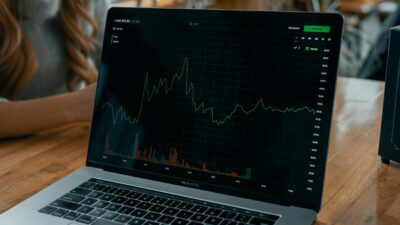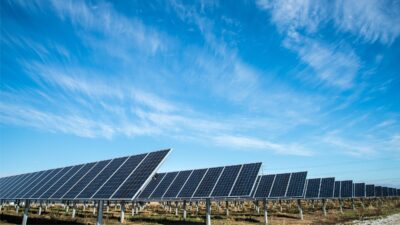Sydney Business Insights and Matthew Egan

Running out of water on the blue planet
In the world’s climate emergency, water has been playing second fiddle to concerns about greenhouse gases.
But the world’s water problem urgently needs reframing.
‘An entirely different mindset is needed, in shifting from thinking about greenhouse gases, to thinking about water,’ said Dr Matthew Egan, a water accounting expert and Senior Lecturer at the University of Sydney Business School.
‘Crudely, with greenhouse gases, the key challenge is eliminating them, or more correctly, sequestering them back into the biosphere, or ideally, beneath the ground. With water, a key challenge is something of the opposite.’
‘We see an inexhaustible abundance of water on this beautiful blue planet. We know, of course, that much of that total supply is non-potable (not suitable for drinking) and the limited supplies that are suitable for human consumption, are often in the wrong places, difficult to transport, and increasingly polluted from other human activities.’
Humanity overusing water at ‘vampiric’ levels
Water was front and centre at the recent United Nations’ Water Conference in New York, which was attended by more than 10,000 people.
Surprisingly, considering 90% of ‘natural disasters’ are water related, this was the first UN conference on water at this scale since 1977.
The UN Secretary General, Antonio Guterres, sought to raise the water conversation to high alert, telling the conference that the world was over consuming this resource at ‘vampiric’ levels.
“Water is a human right – and a common development denominator to shape a better future”
Antonio Guterres
‘But water is in deep trouble. We are draining humanity’s lifeblood through vampiric overconsumption and unsustainable use, and evaporating it through global heating. We’ve broken the water cycle, destroyed ecosystems and contaminated groundwater.’
The urgency of addressing Sustainable Development Goal 6 (Clean Water and Sanitation) is a major concern for people around the world, but on current trends we will not meet the UN’s 2030 goals.
According to UN-Water and UNESCO, investment needs to be tripled to ensure safe drinking water for all by 2030. On current trajectories, water demand in urban areas will be up to 80% higher by 2050, and the number of people lacking safe drinking water could be as many as 2.4 billion, twice the number in 2016.
This emergency also presents numerous challenges for business: 70% of the world’s freshwater use and pollution are caused by 7 sectors – food, textile, energy, industry, chemicals, pharmaceuticals, and mining.
Guterres called for action on four key points:
The first was ‘closing the water management gap’: governments must develop and implement plans to ensure equitable water access for all people while conserving it where possible. This should include implementing the United Nations Water Convention, which manages cross-border water use.
Increasing investment in water and sanitation systems is also essential. This will require reforming international financial arrangements, so that countries around the world can access funding for projects more easily, and accelerate the reallocation of the IMF’s Special Drawing Rights.
The need for robust infrastructure was also emphasised, including developing disaster resilient pipelines, water delivery systems, wastewater treatment, and forecasting and early warning systems for hazardous weather.
Finally, Guterres noted the crucial issue of addressing climate change more generally, since it is inextricably linked with water supply in numerous ways.
Saving water, saving lives
‘With so much attention focused on climate change, and rightly so, other critical environmental concerns including water, waste and bio-diversity loss, can slip out of sight, especially among the sources of global power that matter,’ Dr Egan said.
‘The water related research I have undertaken in recent years has focused on the critical question of exploring the accounting tools and technologies available to governments, water authorities, and water consumers (including the corporate sector), as they grapple with a range of disparate water related questions.
‘Insights from my research suggest that innovative developments such as Australia’s National Water Accounting Framework, have great potential to contribute to challenges experienced in other water stressed nations. However, the ability to implement them depends on so many other infrastructure, financial, political and social factors.
‘What is needed now is momentum beyond March’s important UN forum. We need both progress with thinking about the further development of effective management and accounting technologies, and also the political and financial will and support, to take these innovations to so many other water stressed nations and locations.
‘March’s UN Water Conference has sharpened the vision of power to this critical global challenge. That momentum must continue now, with tailored financial support from that powerful audience at the UN, to those who have opportunities to achieve concrete and critical actions for the thirsty masses, on this incongruously blue and lonely ball.’
Image: Oleksandr Sushko
Sydney Business Insights is a University of Sydney Business School initiative aiming to provide the business community and public, including our students, alumni and partners with a deeper understanding of major issues and trends around the future of business.
Dr Matthew Egan is a Senior Lecturer in the Discipline of Accounting at the University of Sydney Business School. His research interests focus primarily on sustainability, and how accounting can contribute to addressing related questions.
Share
We believe in open and honest access to knowledge. We use a Creative Commons Attribution NoDerivatives licence for our articles and podcasts, so you can republish them for free, online or in print.







